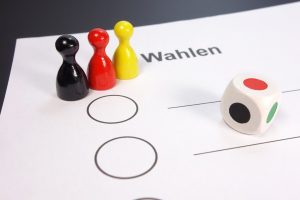📜German Level 2, Activity 12: Politik und die Umwelt / Politics and the Environment (Online)

Description: Students discuss politics in Germany and environmentalism.
Semantic Topics: Politics, Politik, Environment, Umwelt
Products: Posters, Markers, Students’ individual environmental concerns. Poster, Markierstifte, individuelle Umweltbelange der Schüler.
Practices: Students discuss politics and environmental protection in the German language. Studierende diskutieren Politik und Umweltschutz in der deutschen Sprache.
Perspectives: The right for free elections is of crucial importance to those in German speaking lands. Das Recht auf freie Wahlen ist für Menschen im deutschsprachigen Raum von entscheidender Bedeutung. The belief that humans are part of the natural world, and must respect and care for it, is very important to Germans and those in German speaking countries. Der Glaube, dass der Mensch ein Teil der Natur ist und sie respektieren und pflegen muss, ist den Deutschen und den Menschen im deutschsprachigen Raum sehr wichtig.
- Standard: 1.1 Students engage in conversations, provide and obtain information, express feelings and emotions, and exchange opinions.
- Standard: 1.2 Students understand and interpret spoken and written language on a variety of topics.
- Standard: 3.1 Students reinforce and further their knowledge of other disciplines through German.
Idaho State Content Standards:
- Objective: COMM 1.1 Interact and negotiate meaning (spoken, signed, written conversation) to share information, reactions, feelings, and opinions.
- Objective: COMM 2.1 Understand, interpret, and analyze what is heard, read, or viewed in a variety of topics.
- Objective: COMM 3.1 Present information, concepts, and ideas to inform, explain, persuade, and narrate on a variety of topics using appropriate media in the target language.
NCSSFL-ACTFL Can-Do Statements:
- I can discuss the various German political parties.
- I can discuss how I care for the environment.
- I can discuss the importance of the environment and ways in which people can protect it.
Materials Needed:
Warm-Up
- Fragen Sie die Schüler: Kennen Sie die politischen Parteien in den Vereinigten Staaten? Achten Sie darauf, dass die Studierenden sowohl die liberalen als auch die konservativen Parteien in den USA und die deutsche Parteiendiskussion respektieren.
- Konservative Parteien in den Vereinigten Staaten: Republikaner, Libertäre
- Liberale Parteien in den Vereinigten Staaten: Demokratische Partei, Grüne Partei
Main Activity
- Vorstellung der politischen Parteien. Fragen Sie die Schüler, ob sie die politischen Parteien in Deutschland kennen?
Ask the students: “Do you know the conservative parties of Germany?”
- Kennen Sie die konservativen Parteien Deutschlands?
Conservative Parties in Germany: Christian Democratic Union of Germany (CDU), Christian Social Union in Bavaria (CSU), Free Democratic Party (FDP), Alternative for Germany (AfD), Free Voters, (FW), German Centre-Party (ZENTRUM), Ecological Democratic Party (ÖDP), Liberal Conservative Reformers (OKR), Family Party of Germany (Familie)
- Konservative Parteien in Deutschland: Christlich Demokratische Union Deutschlands (CDU), Christlich-Soziale Union in Bayern (CSU), Freie Demokratische Partei (FDP), Alternative für Deutschland (AfD), Freie Wähler (FW), Deutsche Zentrumspartei (ZENTRUM), Ökologisch-Demokratische Partei (ÖDP), Liberal-konservative Reformer (LKR), Familien-Partei Deutschlands (Familie)
Ask the students: “Do you know the liberal parties of Germany?”
- Fragen Sie die Schüler: “Kennen Sie die liberalen Parteien in Deutschland?”
Liberal Parties in Germany: Social Democratic Party of German (SPD), Alliance 90/The Greens, (Grüne), The Left (LINKE), Volt Germany (Volt)
- Liberal Parteien in Deutschland: Sozialdemokratische Partei Deutschlands (SPD), Bündnis 90/Die Grünen (Grüne), Die Linke (LINKE), Volt Deutschland (Volt)
Ask students: “Do you know of any bourgeois or non-political parties?”
- Fragen Sie die Schüler: “Kennen Sie die bürgerliche oder unpolitische Parteien?”
Center/APolitical: South Schleswig Voters’ Association (SSW),The Party (Die PARTEI), Pirate Party (PIRATEN)
- Mitte/APolitisch: Südschieswigscher Wählerverband (SSW), Partei für Arbeit, Rechtsstaat, Tierschutz, Elitenförderung und basisdemokratische Initiative (Die PARTEI), Piratenpartei Deutschland (PIRATEN)
- Warum oder warum nicht sollte das deutsche politische System besser funktionieren als das System der Vereinigten Staaten?
- Was findet ihr am wichtigsten, wenn man an Umweltschützer denkt?
- Eine Veranstaltung mit dem Thema „Umweltschutz“ braucht ein neues Plakat. Du solltest das tun! Teilen Sie die Schüler in Breakout-Räume von zwei oder drei auf. Jeder Raum sollte eine Google-Folie erstellen und wie im Beispiel ein Bild und Wörter hinzufügen. Warum ist es wichtig? Erklären Sie uns das.
- Bringen Sie sie wieder zusammen und lassen Sie jeden Raum seine Google Slide präsentieren!
Wrap-Up
- Was macht ihr für die Umwelt? (What are you doing for the environment?)
End of Activity:
- Read Can-Do statements once more and have students evaluate their confidence. (Use thumbs up/thumbs down)
- Encourage students to be honest in their self-evaluation.
- Pay attention, and try to use feedback for future activities!
NCSSFL-ACTFL Can-Do Statements:
- I can discuss the various German political parties.
- I can discuss how I care for the environment.
- I can discuss the importance of the environment and ways in which people can protect it.
CUltural Resources
First is a Meet the Germans video over the History of Elections in Germany. This is in English with German subtitles. The second video is an interview, from DW, with Angela Merkel in German, after the Elections in 2021.
How to Remix a Pathways Project Activity
Feeling creative? The Pathways Project needs your help in remixing activities for the K-12 classroom.
Try taking an activity to the next level by:
- Add new content (something you’ve created or another OER source)
- Contribute additional activity suggestions
- Integrate authentic materials such as videos, infographics, photos, etc.
- Suggest how to implement the activity in the classroom
- Customize the content for a specific audience or group of learners (for example, K-5 learners or to differentiate for student’s needs)
We want to make it easy to share back with the larger Pathways Project Community! Simply, click this link to remix this activity.
Please consider sharing your remixed activity with us by emailing the activity link to Pathwaysproject@boisestate.edu so that Pathways continues to grow!

